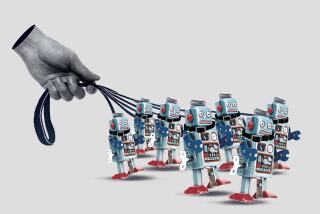Technologists contemplate a world without Jobs
As family and close friends planned for a private funeral for Steve Jobs, the technology world was left pondering whether one of its most innovative periods might have come to an end.
For the last 30 years, the story of personal technology has in many ways been the story of Jobs and his successes: from the first popular home computer to the machine on which the Web was invented — and now iPods, iPhones and iPads, the most talked about, written about and imitated devices anywhere.
All of them were the brainchildren of Jobs, a technologist whose relentless perfectionism and long experience helped set the technology agenda for decades. But now that consumer technology has lost the figure who had plotted its course for so long, will his absence leave the industry without a clear direction?
Photos: Steve Jobs | 1955-2011
Apple and its products have been “the standard to which everyone compared themselves,” said John R. White, the chief executive officer of the Assn. for Computing Machinery, the industry’s 65-year-old scientific and educational society. “Will there be a central force, whether a company or a new technology, that defines where we all head next? I fear that there won’t be.”
Not that innovation would cease and the U.S. Patent Office would close for lack of new inventions — indeed, observers said there is more technological innovation now than ever before.
Instead, White said, without Jobs as the industry’s unifying presence, technology’s near future might lose focus and begin to resemble “a kind of a garbage collection, cleaning up all the lessons we’ve learned up to this point — consolidating what we know works well, rather than envisioning it in advance.”
Each member of Jobs’ trio of mobile devices is the bestselling in its class — no single phone sells more than the iPhone, the iPod accounts for nearly 80% of music players sold in the U.S., and the iPad remains the only successful tablet computer to date, despite dozens of entries from competitors around the globe.
“Of course the tech world is going to the miss this guy,” said John Danner, a senior fellow and innovation scholar at UC Berkeley’s Haas School of Business. “Apple and Jobs have been so central on so many different dimensions. He not only created whole categories, he occupied them predominantly — everyone else has been playing catch-up or ‘me too.’ ”
“It’s likely that there will be a reorienting period,” he said. “Undoubtedly people are now hunkering down in labs and studios all over the world trying to figure out how to occupy what they expect to be a vacuum, and establish themselves as the new pacesetter.”
Jobs’ products accelerated the adoption of personal technology by the general population, a trend that also brought wide interest to a technology industry that had once been the province of hobbyists and technophiles. That interest was reflected by increased coverage of technology by media outlets and the rapid proliferation of blogs devoted to the many nuances of gadgetry and the electronics industry. Many of the most prominent new blogs – 9to5Mac, AppleInsider, MacRumors — were devoted to collecting and dissecting even the smallest details of Apple’s business and products.
Apple’s singular presence in the technology sphere was still visible Tuesday at the company’s headquarters in Cupertino, where its auditorium was packed with industry leaders, Wall Street analysts, camera crews and journalists from around the world, all busily describing the new iPhone’s unveiling to millions tuned in online.
To many Apple fans and technology analysts, the new phone lacked the striking futuristic quality that many of its previous products seemed to have. For many, the event renewed questions about whether the company could lose its footing without Jobs, its co-founder, head designer and public face.
For one thing, there was no clear heir to Jobs and his mastery of “arranging ideas, art and technology in ways that repeatedly invented the future,” as his current biographer, Walter Isaacson, said in an upcoming piece for Time magazine.
Photos: Steve Jobs | 1955-2011
“I think we are in big trouble if we try to fill the Steve Jobs’ slot,” said Steven Levy, a senior writer at Wired magazine and author of two books on Apple and its products. “It would be unfair to critique people based on their Steve-ness. That’s a contest that no one can win.”
Times staff writer Jessica Guynn in San Francisco contributed to this report.






